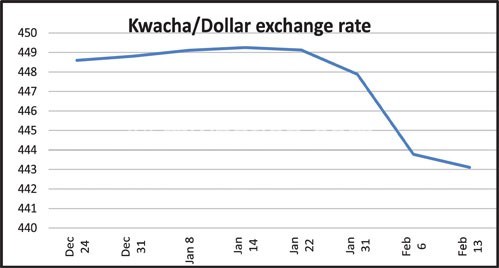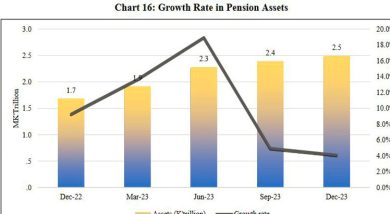RBM speaks on kwacha appreciation

The Reserve Bank of Malawi (RBM) has attributed the recent dramatic gain in the value of the kwacha to other foreign reference currencies to the central bank’s continued implementation of tight monetary policy.
The central bank’s spokesperson, Mbane Ngwira, speaking in an exclusive interview on Tuesday, said in essence the tight monetary policy has resulted into the bank mopping out excess kwacha liquidity out of the system and hence bringing down mounting demand for foreign exchange.
Ngwira has also linked the shrinking demand for dollars and other major foreign currencies on the market to the restrained government expenditure by treasury which he said is supporting RBM’s stance to mop out excess liquidity.
Said Ngwira: “Instead of selling out the dollars, we have been taking the kwacha out of the system which is bringing down demand for dollars. Now demand for dollars is not that all high, it’s suppressed.”
After months of ceding to the dollar, beginning last week, the local currency made a U-turn, selling at an average of K444 per one dollar as of yesterday from over K450 in the preceding week.
In fact, the currency peaked to as high as K468 in some foreign exchange bureaus, based on daily market statistics published by RBM.
On Monday, the kwacha was selling as low as K39 to the South African rand from K45 it was trading last week.
The appreciation comes deep into the lean period where importers scramble for little available dollars on the market to finance for fertiliser imports, among other key imports.
It also comes in the thick of continued donor aid freeze totaling $150 million towards budget support and also before the opening of the tobacco market somewhere next month.
“Of course, this appreciation [of the kwacha] has become before our expectation. It could be appreciating further but that will depend on our policy implementation. But just like anyone else, as a central bank we would want a stable currency,” added Ngwira.
Last week, some economic commentators attributed the sudden strengthening of the kwacha to the positive review of the country’s economy by the International Monetary Fund (IMF), among other factors.
Following the positive review, IMF approved the injection of $20 million towards the IMF-supported Extended Credit Facility (ECF) worth about $156 million.
But Ngwira described the perception triggered by the IMF injection as just psychological which he said cannot be sustained without the support by RBM’s tight monetary policy implementation.
“If you look at $20 million out of $188.1 million, you find that $20 million is basically nothing and the fact is that RBM has been purchasing dollars from the market which has lessened demand for the dollars,” added Ngwira.
Malawi’s monthly foreign exchange consumption or import cover is currently pegged at $188.1 million.






Rather, it’s because dollar is weakening/depreciating, not what you are saying. Liar
very embarrassing where has the dollar depreciated. iwe mbuli eti, us economy is getting stronger. yamikani zochepa zikamachitika
The answer to this puzzle lies else where. Yes RBM action of mopping up liquidity can contribute a tiny bit to exchange appreciation through the “transmission mechanism”, but its effects are well known to have a long lag of up to 1- 2 years. Currency exchange rise is a cross border issue. I commented in Nov that Malawi kwacha can be stabilised right here right now by simply balancing the current account balance (CAB) or in simple terms the import-export equation. On the left hand side are Imports (dollars going out of Malawi) and on the right hand are exports (dollars coming into Malawi including AID). The action of RBM does not directly affect import/export. it only affects the above equation indirectly by encouraging banks to buy govt bonds (repos) instead of lending the money to investors to import equipment. That is why this “credit channel” effects takes time.
The real answer to the puzzle lies in the action taken by the Ministry of Finance to cut Government spending on imports on the left hand side of the above equation. On the right hand side of the equation is the transfer payment (some Aid) that has been injected into the Malawi economy. Although EUdonors are still freezing aid, the US has come to the rescue for the Malawi economy here with the injection of $700m (or part thereof). A portion of this US money that has so far been converted into kwacha plus the IMF $20m is responsible for this sudden appreciation of the kwacha. Also do not forget that Kayelekera has stopped importing raw materials on the left hand side of the equation. It is also possible that some FDI has been pumped into the economy but I will not speculate on that. These factors have immediate direct impact on the exchange rate than liquidity mopping by RBM. Therefore, I conclude that this enigma puzzle has been due to the above outlined factors. Q.E.D.
Why is there perpetual excess liquidity despite continuous Mopping year after year? The paradigm need to shift